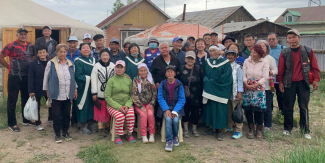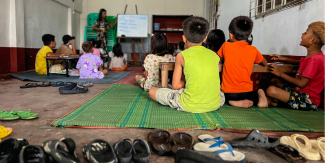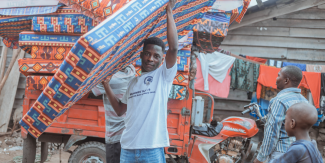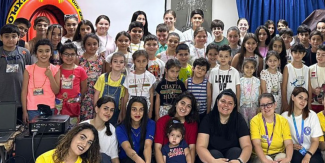June 11, 2019 · NCM STAFF
Photo by NCM South America
William, 52, and his family were sleeping on the streets near a bus station in Boa Vista, Brazil, when they heard someone preaching in Spanish. They are strong followers of Christ, and they moved toward the pastor to hear what he had to say.
William had left Venezuela with his wife and daughter, who was pregnant at the time, and they knew their money was not going to last. By selling some of their items, they had had just enough for the multi-day bus fare and food for the journey. They knew they would have a difficult time when they arrived, but even that seemed like a better option than staying; their daughter needed antibiotics, and there weren’t any available. Through the Church of the Nazarene, the family was able to stay in a small shelter.
“By the mercy of our Lord, the Hispanic Nazarene Church opened their doors,” William says.
For the last six years, Venezuela has been in various states of turmoil and unrest. Hyperinflation has caused prices of essentials to skyrocket, and people are left without any way to buy food regularly. By the end of 2018, prices were doubling on an average of every 19 days. Medicine has become increasingly unavailable. Diseases and illnesses thought to be eliminated—such as measles and diphtheria—are beginning to reappear. In a country that had once eliminated malaria, incidents of that illness are rising, too. Out of 24 states, 10 have had cases reported.
People are leaving because they feel that they don’t have a choice. According to the United Nations, 3 million Venezuelans have left the country since 2014. William says his family came when they couldn’t afford anything in Venezuela anymore. “I came for a better future for me, for my daughter, for my grandson that was to be born,” he says.
EXPANSIVE CARE
The pastors and congregation at the Church of the Nazarene in Boa Vista, Brazil, knew they wanted to do something to help. Boa Vista is not far from the border with Venezuela, and many people were coming there. In March 2016, they began to reach out to people in public spaces such as parks, where the hundreds of people crossing the border end up in makeshift camps with little shelter. Within a year, the church had started a food distribution service on Thursday nights that served approximately 1,500 people every week. The need for more was becoming rapidly clearer.
Photo by NCM South America
From that first response, the church in Boa Vista has started a Spanish-speaking church to minister to the Venezuelans in Brazil, where most people speak Portuguese. About 200 people attend the new church, 40 of whom stay at a shelter housed in the church’s buildings. New classes have also grown out of the need; about 400 people attend Portuguese classes, and others are learning marketable skills such as baking and sewing.
Julio, 43, has been staying at the church in Boa Vista, where he is able to help with some carpentry work. He traveled to Brazil with his family; at home in Venezuela, the lack of food and medical attention was becoming dangerous for his wife, who was pregnant at the time. “At least here there is food, nourishment,” he says.
Photo by NCM South America
While Julio hasn’t been able to find steady work, he and his family have been aided immensely by church members. They have supported them with everything, he says. They have helped with food and shelter and by giving him carpentry work around the building. It has not been easy for the family, and the road ahead is not simple. Julio is lucky to have hard skills in carpentry, which should make it easier to find a job. But without being able to speak Portuguese, finding work may continue to be difficult. The church has become like a family, though.
“In the midst of everything, God is the church,” he says. “You have to have faith, give thanks for everything too. ... But the church for me is the whole world.”
Taken from the latest edition of NCM Magazine. To read the rest of the article, click here.






Add new comment